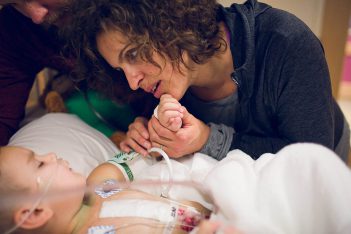As a workplace empathy consultant, Liesel Mertes is in the business of helping employers know how to help workers deal with grief.
The Home Place resident has degrees from Wheaton College and the Kelley School of Business at Indiana University, but much of her professional knowledge base comes from personal experience. Her daughter, Mercy Joan, died in 2011 at eight days old after being born with encephalocele, a rare condition that causes the skull to not close properly.
“We buried her, and then a week-and-a-half later it was time to go back to what was my workplace, to go back to school,” said Mertes, who was working on her MBA at the time. “That was my first foray into the world of people who knew intuitively how to care for me and the people who didn’t.”

Then, in 2014, her son, Moses, was born with a congenital heart demafect and had his first surgery as a newborn. He’s doing well now but is expected to require additional surgeries as he grows.
“That was another step into the world of people wanting to help but feeling ill-equipped and overwhelmed about how to do that,” Mertes said.
The experiences opened Mertes’ eyes to the fact that limited resources exist to help businesses assist employees dealing with personal tragedies, so she began developing Handle With Care, a consultancy that partners with businesses to support employees as they deal with everything from a death in the family to returning to work after having a baby. She’s also launched a “Handle With Care” podcast to discuss the topic of grief in the workplace with a variety of guests who have dealt with difficult situations.
Mertes said that because many people spend more waking hours at work than at home, businesses stand to benefit in several ways by knowing how to support employees in tough times.
According to a 2003 study conducted by the Oregon-based Grief Recovery Institute, employers lose more than $75 billion – or more than $113 billion when adjusted for inflation – annually as a direct result of employees working through grief. This includes absenteeism, decreased productivity because of distractions and the impact of those who quit because the employer was ill-equipped to handle the situation.
The study also showed that indirect costs, such as medical-related expenses, workplace accidents and costs associated with behaviors such as alcohol abuse, reached more than $600 billion a year in the U.S.
The Grief Recovery Institute has developed the Grief Recovery Method that it offers to employers and others dealing with loss, but Ed Owens, the institute’s director of advanced GRM programs, said he’s observed that businesses that offer any type of support to employees going through grief can benefit.
“(When) the employees feel supported and get the help they need, then they don’t need to access as many services and they can be more present in the workplace,” Owens said.
Mertes said learning how to help employees handle grief is important for a company’s reputation as well.
“If you mishandle somebody and they quit, they’ll talk about you,” Mertes said. “But if you are the employer that they say, ‘All throughout my husband’s journey with cancer they were there for me and I felt like they had my back,’ you’ve won an advocate for life, no matter where (that employee goes) on a vocational journey.”
Mertes is working to raise capital to continue building Handle With Care, which she hopes will become national in scope at some point. By 2020, she is planning to offer a full suite of services for human resources departments, including video tutorials, feedback sessions and online tools.
She said the program isn’t a perfect fit for every business, but it could help set employers apart in a competitive labor market.
“For forward-thinking employers who are thinking about how to keep their people, I think this is a product whose time has come,” she said.
Learn more at lieselmertes.com. Listen to the Handle With Care podcast at stitcher.com/podcast/liesel-mertes/handle-with-care-empathy-in-the-workplace.

MEET LIESEL MERTES
Family: Husband, Luke, and five children, Ada, 11; Magnus, 9; Mercy Joan (deceased); Jemima, 6; and Moses, 5.
Education: Heritage Christian School class of 2002; bachelor’s degree in political science and government from Wheaton College; MBA from Kelley School of Business at Indiana University; working on a Master of Divinity from Fuller Theological Seminary.
Hobbies: A rower in college, she now enjoys paddle boarding. She also enjoys reading (nonfiction and The New Yorker and The Economist), hiking and cooking.



